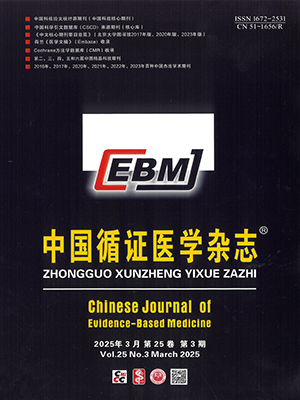| 1. |
Friedman S. Alcoholic liver disease, cirrhosis, and its major sequelae in: Goldman L, Bennett JC, eds. Cecil Textbook of Medicine. 21st ed. Philadelphia, Pa: Saunders, 2000: 804-812.
|
| 2. |
Arroy V, Gines P, Gerbes AL, et al. Definition and diagnostic criteria of refractory ascites and hepatorenal syndrome in cirrhosis. Hepatology, 1996, 33(1): 164-173.
|
| 3. |
Pere G, Monica G, Vicente A, et al. Hepatorenal syndrome. Lancet, 2003, 362: 1819-1827.
|
| 4. |
Guyatt GH, Rennie D, Editors, The evidence-based medicine working group. Use’s guides to the medical literature: A manual for evidence-based clinical practice. AMA Press, Chicago, 2002.
|
| 5. |
Gluud LL, Kjaer MS, Christensen E. Terlipressin for hepatorenal syndrome. Cochrane Database of Systematic Reviews: Reviews 2006 Issue 4.
|
| 6. |
Cade R, Wagemaker H, Vogel S, et al. Hepatorenal syndrome. Studies of the effect of vascular volume and intraperitoneal pressure on renal and hepatic function. Am J Med, 1987, 82(3): 427-438.
|
| 7. |
Pomier LG, Paquin SC, Hassoun Z, et al. Octreotide in hepatorenal syndrome: a randomized, double-blind, placebo-controlled, crossover study. Hepatology, 2003, 38(1): 238-243.
|
| 8. |
Bruha R, Skupiny C, Balihar K, et al. Diagnostics and therapy of hepatorenal syndrome. Recommendations of the working group on portal hypertension of the Czech Hepatology Society and the J.E.Purkinje Czech Medical Society. Vnitr Lek, 2006, 52(6): 649-650.
|
| 9. |
Angeli P, Guarda S, Fasolato S, et al. Switch therapy with ciprofloxacin vs. intravenous ceftazidime in the treatment of spontaneous bacterial peritonitis in patients with cirrhosis: similar efficacy at low cost. Alim Pharm Ther, 2006, 23(1): 75-84.
|
| 10. |
Wong F, Pantea L, Sniderman K. Midodrine, octreotide, albumin, and TIPS in selected patients with cirrhosis and type 1 hepatorenal syndrome. Hepatology, 2004, 40(1): 55-64.
|
| 11. |
Ortega R, Gines P, Uriz J, et al. Terlipressin therapy with and without albumin for patients with hepatorenal syndrome: results of a prospective, nonrandomized study. Hepatology, 2002, 36(4 Pt 1): 941-948.
|
| 12. |
Duvoux C, Zanditenas D, Hezode C, et al. Effects of noradrenalin and albumin in patients with type I hepatorenal syndrome: a pilot study. Hepatology, 2002, 36(2): 374-380.
|
| 13. |
Uriz J, Gines P, Cardenas A, et al. Terlipressin plus albumin infusion: an effective and safe therapy of hepatorenalsyndrome. J Hepatol, 2000, 33(1): 43-48.
|
| 14. |
Fabrizi F, Dixit V, Martin P. Meta-analysis: terlipressin therapy for the hepatorenal syndrome. Am Fam Phy, 2006, 74(5): 767-776.
|
| 15. |
Solanki P, Chawla A, Garg R, et al. Beneficial effects of terlipressin in hepatorenal syndrome: a prospective, randomized placebo-controlled clinical trial. J Gastrol Hepatol, 2003, 18(2): 152-156.
|
| 16. |
Alessandria C, Venon WD, Marzano A, et al. Renal failure in cirrhotic patients: role of terlipressin in clinical approach to hepatorenal syndrome type 2. Euro J Gastroenterol Hepatol, 2002, 14(12): 1363-1368.
|
| 17. |
Hadengue A, Gadano A, Moreau R, et al. Beneficial effects of the 2-day administration of terlipressin in patients with cirrhosis and hepatorenal syndrome. J hepatology, 1998, 29(4): 565-570.
|
| 18. |
Halimi C, Bonnard P, Bernard B, et al. Effect of terlipressin (Glypressin) on hepatorenal syndrome in cirrhotic patients: results of a multicentre pilot study. Eur J Gastroenterol Hepatol, 2002, 14(2): 153-158.
|
| 19. |
Moreau R, Durand F, Poynard T, et al. Terlipressin in patients with cirrhosis and type 1 hepatorenal syndrome: a retrospective multicenter study. Gastroenterology, 2002, 122(4): 923-930.
|
| 20. |
Guevara M, Ginès P, Fernández-Esparrach G, et al. Reversibility of hepatorenal syndrome by prolonged administration of ornipressin and plasma volume expansion. Hepatology, 1998, 27(1): 35-41.
|
| 21. |
Angeli P, Volpin R, Gerunda G, et al. Reversal of type 1 hepatorenal syndrome with the administration of midodrine and octreotide. Hepatology, 1999, 29 (6): 1690-1697.
|
| 22. |
Mitzner SR, Stange J, Klammt S, et al. Improvement of hepatorenal syndrome with extracorporeal albumin dialysis MARS: results of a prospective, randomized, controlled clinical trial. Liver Transpl, 2000, 6(3): 287-289.
|
| 23. |
Rossle M, SiegertetterV, HuberM, et al. The first decade of the transjugular intrahepatic portosystemic shunt ( TIPS) : state of the art. Liver, 1998, 11(1): 73-89.
|
| 24. |
Brensing KA, Textor J, Perz J, et al. Long term outcome after transjugular intrahepatic portosystemic stent-shunt in non-transplant cirrhotics with hepatorenal syndrome: a phase II study. Gut, 2000, 47(2): 288-295.
|
| 25. |
Kalambokis G, Economou M, Fotopoulos A, et al. The effects of chronic treatment with octreotide versus octreotide plus midodrine on systemic hemodynamics and renal hemodynamics and function in nonazotemic cirrhotic patients with ascites. Am J Gastrol, 2005, 100(4): 879-885.
|




